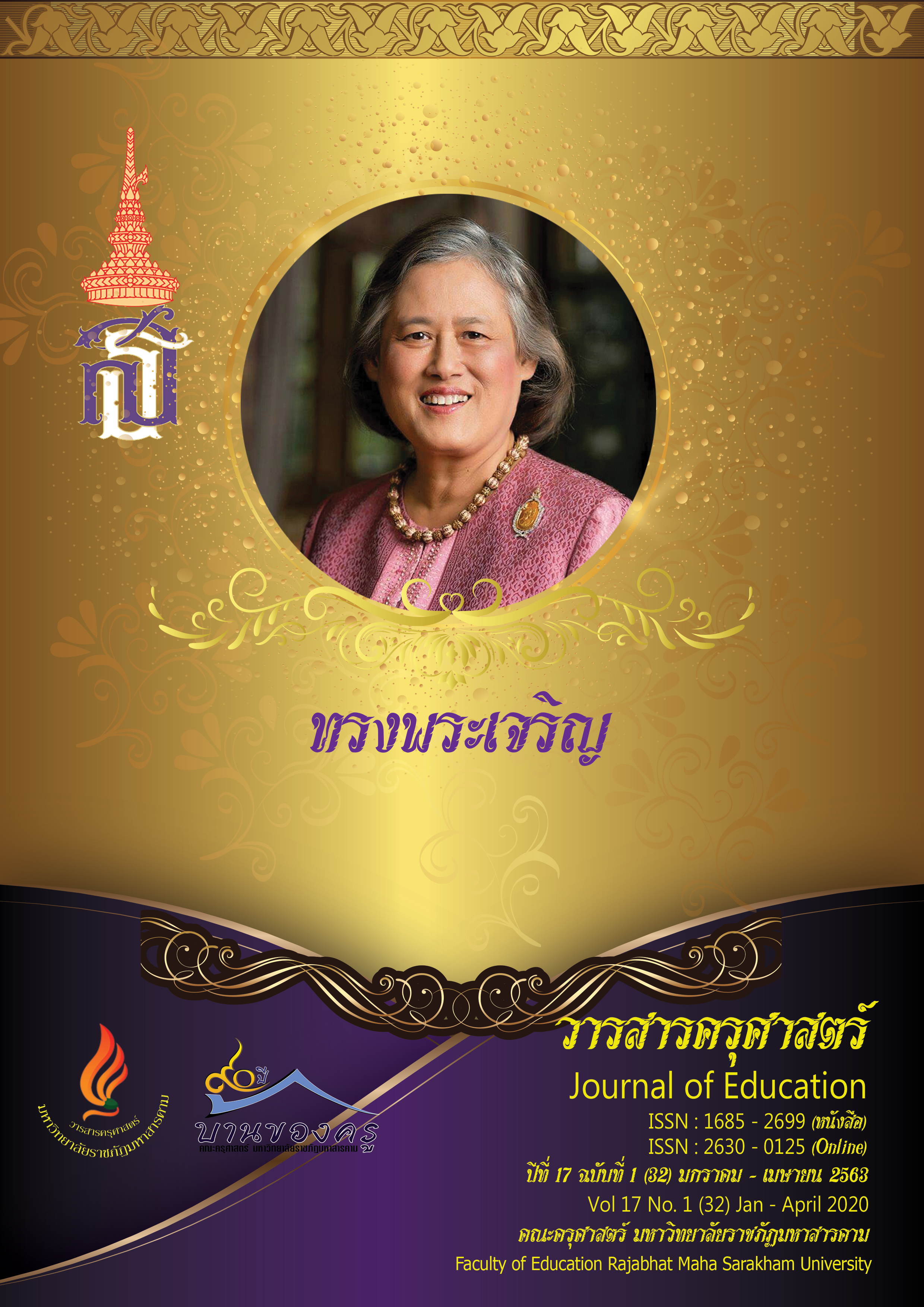Participatory Learning Model between School and Community in Organic Agriculture using Organic Principles of Environmental Education to the Consciousness Development in the Local Community
Main Article Content
Abstract
The purposes of this research were: 1) to study states, 2) to develop the model, and
3) study the effect of participatory learning model between school and community in organic
agriculture using organic principles of environmental education to the conscious mind development
in the Local Community and there was divided into 3 phases. The population and sample group
were (1) 85 schools, (2) 73 informants by purposive sampling technique. Statistical data analyzed
were mean, standard deviation, t-test, and descriptive statistics.
The research revealed that Phase 1: concerning the demand condition of informants in the
local have needs and demands at a high level; Phase 2: effect of the model developed was
appropriate and feasible to bring the actual practice at a higher level; Phase 3: effect of the model
implementation found that students had overall learning performance in 3 sides based on
curriculum’s fixed that there have after average score high more than before at 0.01 significance.
Article Details
ข้อกำหนดเบื้องต้นที่ผู้นิพนธ์(ผู้ส่งบทความ) ควรทราบ
1. ผู้นิพนธ์ที่ประสงค์จะลงตีพิมพ์บทความกับวารสาร ตั้งแต่เดือนมกราคม 2563 เป็นต้นไป ให้ใช้รูปแบบใหม่ (Template 2563) โดยสามารถดูตัวอย่างได้ที่เมนู GUIDELINES
2. จะตีพิมพ์และเผยแพร่ได้ ต้องผ่านการประเมินจากผู้ทรงคุณวุฒิ (Peer Review)
3. การประเมินบทความโดยผู้ทรงคุณวุฒิ (Peer Review) เป็นแบบ Double Blind
4. การอ้างอิงบทความใช้หลักเกณฑ์ APA (American Psychological Association) คลิก
5. บทความถูกปฏิเสธการตีพิมพ์ ไม่ผ่านการประเมิน ผู้นิพนธ์ขอยกเลิกเองหรือชำระเงินก่อนได้รับการอนุมัติ ทางวารสารไม่มีนโยบายการคืนเงิน
References
ทิศนา แขมมณี. (2547). ศาสตร์การสอน (พิมพ์ครั้งที่ 7). กรุงเทพมหานคร: จุฬาลงกรณ์มหาวิทยาลัย,
. (2551). ศาสตร์การสอน (พิมพ์ครั้งที่ 9). กรุงเทพมหานคร: จุฬาลงกรณ์มหาวิทยาลัย.
นิธิ เอี่ยวศรีวงศ์. (2536). ภูมิปัญญาท้องถิ่นกับสังคมไทย. เชียงใหม่: โรงพิมพ์ มหาวิทยาลัยเชียงใหม่
บุญชม ศรีสะอาด. (2545). การวิจัยเบื้องต้น (พิมพ์ครั้งที่ 7). กรุงเทพมหานคร: สุวีริยาสาสน์.
ประดิษฐ์ นัดทะยาย. (2549). การพัฒนารูปแบบการบูรณาการกองทุนชุมชน : ศึกษาเฉพาะกรณีตำบลหนองบัว
อำเภอบ้านฝาง จังหวัดขอนแก่น (วิทยานิพนธ์ปริญญาศิลปศาสตรมหาบัณฑิต). มหาวิทยาลัยขอนแก่น,ขอนแก่น.
ประเวศ วะสี. (2551). สุขภาวะที่สมบูรณ์. หมอชาวบ้าน, 352
ปาริฉัตร ลีลาเลอเกียรต. (2554). รูปแบบการจัดการเรียนการสอนภูมิปัญญาท้องถิ่นเพื่อพัฒนาธุรกิจในโรงเรียนและชุมชน (วิทยานิพนธ์ปริญญาปรัชญาดุษฎีบัณฑิต). มหาวิทยาลัยมหาสารคาม, มหาสารคาม.
มรกต วัฒนศักดิ์. (2553). โรงเรียนอนุบาลเอกชน : การพัฒนารูปแบบการจัดการความรู้จากฐานภูมิปัญญาพื้นบ้านอีสานด้านการดูแลพัฒนาการเด็ก (วิทยานิพนธ์ปริญญาปรัชญาดุษฏีบัณฑิต). มหาวิทยาลัยมหาสารคาม,มหาสารคาม.
วิชัย ภูโยธิน. (2553). หน้าที่พลเมือง ม.4-ม.6. กรุงเทพมหานคร: อักษรเจริญทัศน์
. (2553). หน้าที่พลเมืองและการดำเนินชีวิตในสังคม. กรุงเทพมหานคร: อักษรเจริญทัศน์.
สนธยา พลศรี. (2550). เครือข่ายการเรียนรู้ในงานพัฒนาชุมชน. กรุงเทพมหานคร: โอเดียนสโตร์.
สมพร สุทัศนีย์. (2554). มนุษยสัมพันธ์. กรุงเทพมหานคร: สำนักพิมพ์แห่งจุฬาลงกรณ์มหาวิทยาลัย.
สุพัตรา สุภาพ. (2554). กลยุทธ์ทำธุรกิจได้พัน ๆ ล้านบาท. for Quality, 17(161), 80-82.
โสภา ชปีลมันน์. (2553). การแสดงออกทางใบหน้า. วารสารวิจัยระบบสาธารณสุข, 4(1), 26-30.
อรวรรณ บุญส่ง. (2551). ผลการพัฒนาจิตสกนึกในการอนุรักษ์และพัฒนาสิ่งแวดลอมของนักเรียนชั้นมัธยมศึกษา
ปีที่ 3 โดยใช้กิจกรรมสิ่งแวดล้อมศึกษาประกอบการประเมินตามสภาพจริง (ปริญญานิพนธ์ปริญญาการศึกษามหาบัณฑิต). มหาวิทยาลัยศรีนครินทรวิโรฒ, กรุงเทพมหานคร.
Bugental, D. B., and Grusec, J. E. (2006). Socialization Processes. In Eisenberg, N., Damon, W.,and Lerner, R. M. (Eds.), Handbook of child psychology: Social, emotional, and personality development. John Wiley & Sons Inc.
Calhoun, C. (2010). The idea of emergency: humannitarian action and global (dis)order. in Fassin, D. and Pandolfi, M. (eds). Contemporary states of emergency: the polities of military and humanitarian intervention. New York: Zone Books.
Gold, S. E. (2000). Community organizing at a neighborhood high school : Promises and dilemmas in building parent - educator partnership and collaborations.Pro Quest Digital Dissertations, 60(7), 295.
Joyce, B., and Weil, M. (1996). Model of teaching. Boston: Allyn and Bacon.
William, L. K. (1992). An empirical validation of the theory of tranformational leadership in secondary in Singapore. Dissertation Abstracts International, 52(14), 602–A.


